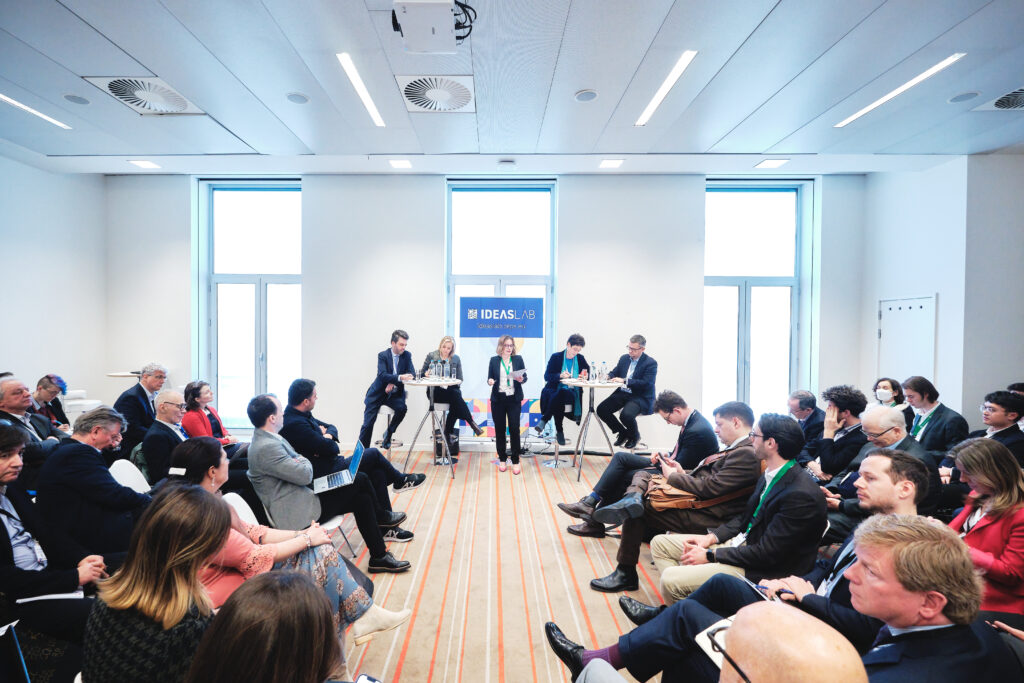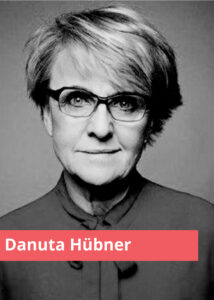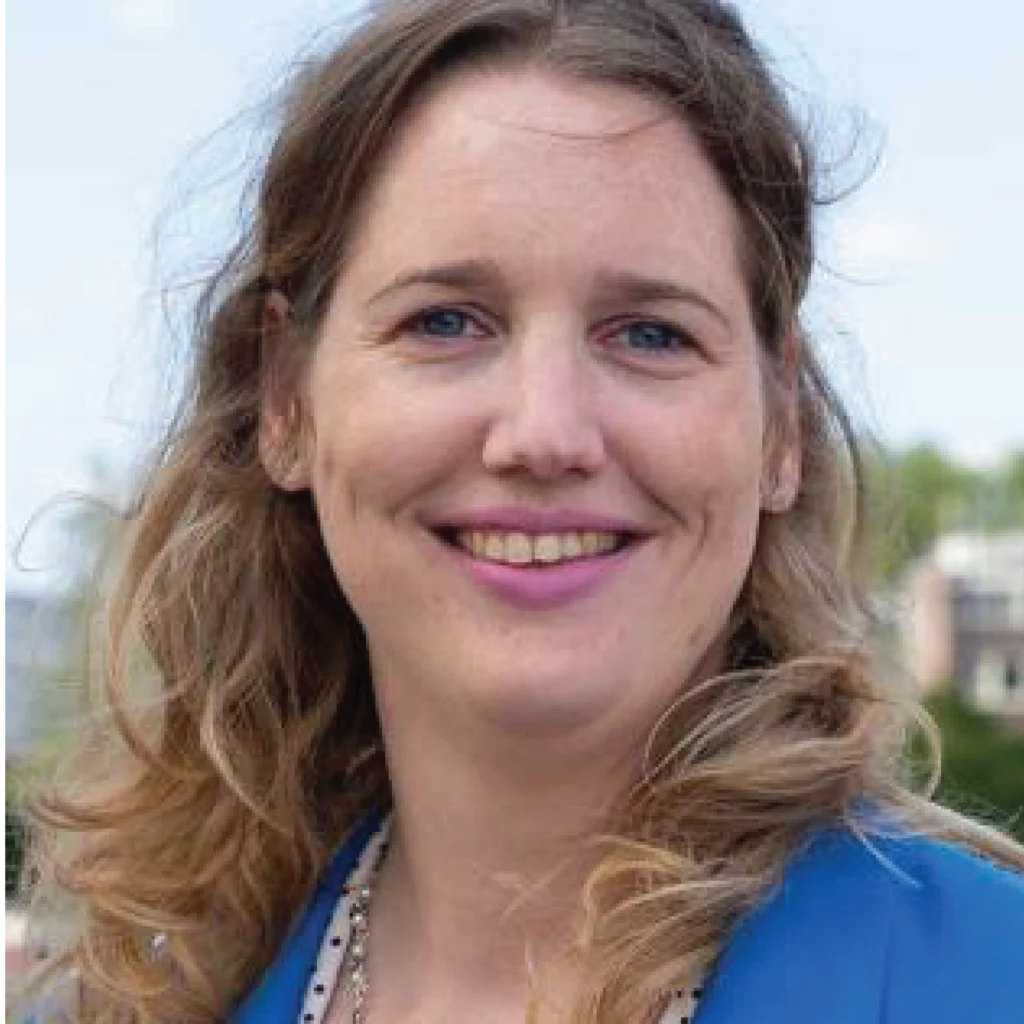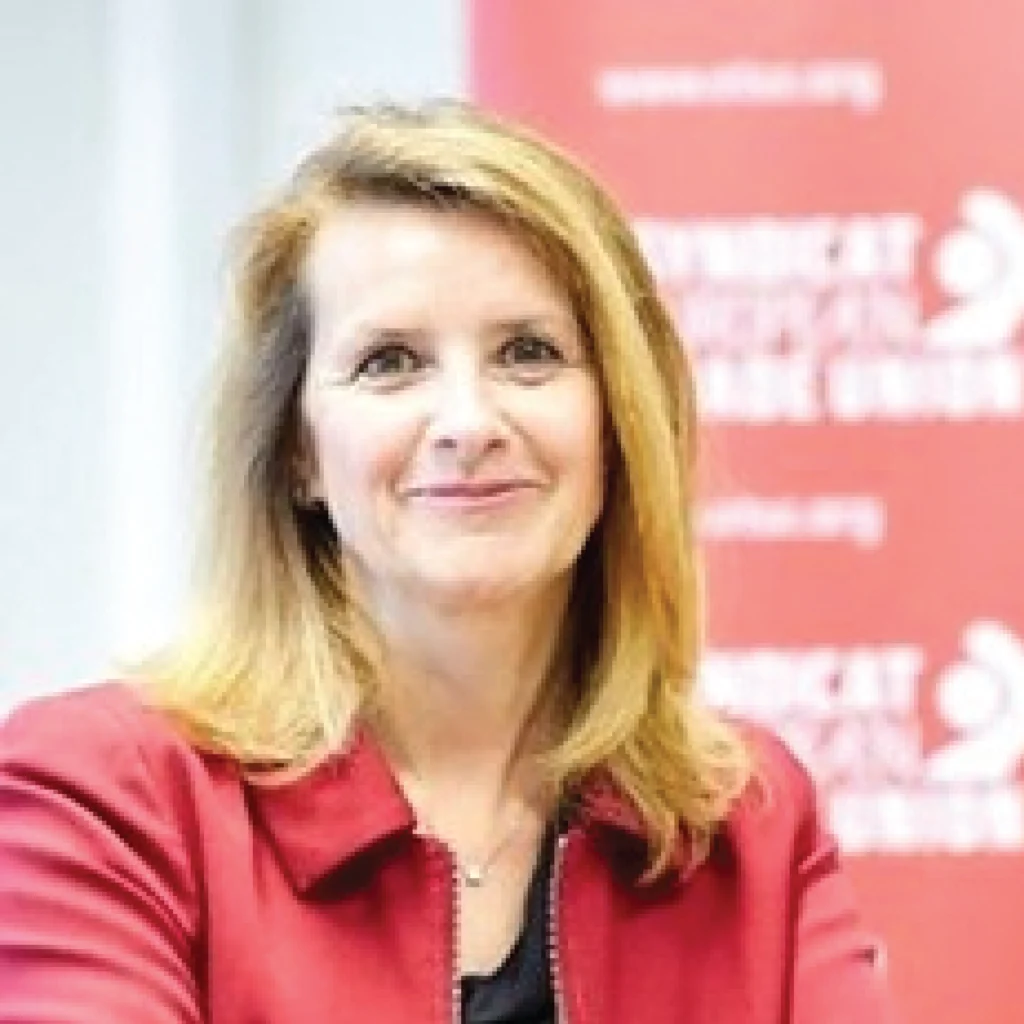

Celebrating more than a decade of thought-provoking discussions, the 2024 edition of CEPS Ideas Lab returned rejuvenated and reimagined over two days from 4 to 5 March. For its 11th edition, CEPS went back to basics with a key focus on what is it that makes Ideas Lab unique – presenting innovative ideas that spur European policymaking forward and help CEPS to fulfil its guiding mantra: to think ahead for Europe (and the world).
Alongside hard-hitting plenary sessions featuring high-level speakers from academia, institutions and the private sector, we organised 24 dynamic, interactive closed-door sessions and mostly without the use of slides or other audiovisual supports. 7 of these 24 sessions were dedicated to brand new ideas to be considered by policymakers, including the new EU leaders that will begin their mandates towards the end of 2024. The result was unprecedented levels of dynamism in our conversations, and sparks of absolute creativity.
Each idea presented was led by a promoter based on previous research, which had already been summarised into a CEPS Expert Commentary and made available to the audience before each session.
Like last year, we organised an evening event at Bozar. This year’s debate focused on the upcoming European Parliament elections, and on the evolving concept of European identity. The debate included the participation of five Members of the European Parliament, as well as renowned academics.
With so much policy designed in Brussels for the EU – and the world – CEPS ideas Lab fills a gap in providing a platform for original thinking on the many challenges facing today’s world.

Karel Lannoo
CEO

Andrea Renda
Director of Research
This year’s edition was pivotal for us. We covered an impressive number of topical issues and experimented with a new format, providing ample space for researchers, both young and experienced, from CEPS and beyond, to present their ideas in deeply interactive sessions. Post-Ideas Lab, we’re invigorated and confident that we can make this event an engine of policy innovation in the years ahead
A SPOTLIGHT ON THE NEW IDEAS
OUR PLENARIES
Safeguarding democracy
What future for EU industrial policy?
Scenarios for the future governance of AI
KEY INSIGHTS FROM ACROSS OUR VARIOUS LAB SESSIONS
• Previous attempts at participatory democracy in the EU have faced challenges, but these can be overcome by including diverse voices, transparently addressing hard political questions, and providing expert education on topics to be discussed.
• Visibility, transparency, and managing expectations are crucial for the success of citizens assemblies and their potential for long-term social impact.
• Geopolitical momentum should be leveraged to advance the EU enlargement process, with bold action and a clear perspective on the next steps, including the setting of intermediate milestones.
• Reaffirming commitment to the Western Balkans must include addressing issues such as stimulating political will and
effective communication about integration and its benefits.
• A staged accession model allows for the gradual integration of sectors into the single market, which are anchored in formal negotiation processes and connected to comprehensive reforms in areas such as public administration and the rule of law.
• Leaders of candidate countries must actively pursue reforms and engage with the EU, as well as utilise their available tools to address Euroscepticism and
ensure progress.
- Peace, defence, and migration are the top priorities for European voters, above all other issues, including climate.
- The future of the pro-European coalition in the Parliament is in question – can it adapt by integrating its less enthusiastic, more Eurosceptic members?
- Prebunking (creating mental immunity against misleading arguments) could be used, as part of larger long-term strategy, to tackle the most prevalent misleading narratives.
- Work to prevent misinformation, however, needs to look beyond citizens’ simply lacking awareness of key issues and their intricacies.
- Identifying the core of the misinformation problem, and the right platform on which to fight it, remain key issues for election integrity.
- Democratic security starts with the political engagement of citizens, but also requires multi-level transparency and freedom from foreign interference.
- The primary priority for the EU today is stabilising Ukraine and ending the war. This requires a united EU in its support for Ukraine. Stabilising the Western Balkans is also important.
- Ukraine and the EU need to move away from relying on the US in terms of its defence and reconstruction capabilities, especially given that future support for Ukraine from across the Atlantic cannot be guaranteed.
- Left-leaning citizens are the most in-favour of a European common defence policy.
- The value of the WTO remains undisputed, but its current reforms are unsatisfactory. Structural change is needed to increase flexibility and thus facilitate progress.
- There was consensus that ‘friendshoring’ would lead to uncertain systems and welfare losses for all involved parties – Europe should continue with its support for the multilateral system.
- Private companies are already adapting to risks by increasing stock and diversifying supply chains, moving towards a ‘just in place’ strategy rather than ‘just in time.’
- Concerns were raised about the inherently political nature of ‘friendshoring,’ as this leads to instability, uncertainty, and difficulty in defining who qualifies as a ‘friend.’
- The current multilateral system provides flexibility for countries and firms that no other system can offer.
- Supply shocks, exacerbated by the Covid-19 pandemic and energy price fluctuations, were the primary drivers of inflation over the past couple of years, alongside demand-side effects from fiscal expansion and monetary policies.
- Central banks, including the ECB, demonstrated their commitment to inflation targets through timely action, albeit with some initial delays in reacting to inflation. However, it is now broadly recognised that the ECB has now got inflation under control.
- An effective and forward-looking industrial policy requires working out what industries need to make use of technology, to keep adoption and skills up with the development of (green) technology.
- To close the technology gap there needs to be dialogue with varied stakeholders, particularly cross-sector knowledge exchange.
- Historically labour market policy discussions have centred on unemployment – now they’re on labour shortages.
- There is a substantial evolution in the labour market due to climate change and the digital transition, as well as an aging population. The effects of this will be felt differently across sectors, regions, socioeconomic groups, and types of work.
- More wide-reaching and coordinated policies, funds, and technical support are needed. The goal is not only to get people (re)skilled for the changing needs of the labour market, but also to get people onside.
- Challenges remain in adequately measuring the skills transition, addressing job dissatisfaction, and securing the necessary funding.
- For a just transition, policy solutions need to be coordinated, including standardising regulations, proactive reskilling initiatives, and engaging social partners to garner support and address the socioeconomic dimensions of job creation and quality.
- To ensure the Green Deal is competitive is challenging due to diverse interpretations of what the Green Deal is and a lack of conceptual clarity. This means redefining competitiveness beyond traditional notions.
- There is the need for a strong marketing tool to bridge the narrative gap and effectively communicate the benefits of the Green Deal to diverse audiences.
- Policymakers should establish flexible governance frameworks that balance social equity, environmental protection, and economic incentives.
- Tax systems can be aligned with net zero goals through mechanisms such as green taxes and tax incentives, although current systems often include incentives misaligned with environmental objectives, such as those for fossil fuel use.
- Emissions taxes, while challenging due to cost implications and their potential impact on vulnerable groups, can be combined with cost-reducing measures and revenue allocation strategies to facilitate a smoother transition to cleaner assets.
- Carbon pricing is crucial for climate policy, driving differentiation between clean and dirty alternatives, but must be complemented by other policy instruments to address global emissions reduction efforts and the prevention of carbon leakage.
- A European Large Language Model (LLM) is deemed essential for ensuring control, leadership, and trustworthiness in AI.
- Challenges in LLM implementation include biases in data sources and Europe’s dependence on capabilities developed outside the region, thus there needs to be strategic planning and dedicated infrastructure development.
- Emphasis should be placed on fostering trustworthy AI and leveraging Europe’s existing strengths.
- Concerns about technology dependence and governance to ensure responsible and value-driven innovation need to be addressed.
- There is a mismatch of EU-US policies on the data protection side, with no clear way to solve the transatlantic data transfer dilemma.
- The proposal for a EUR 10 billion EU tech fund to invest in research, innovation, and digital infrastructure has been gaining traction, backed by several EU Member States.
- Defining and implementing ‘sovereignty’ in the digital era requires clarity and alignment with existing initiatives and state aid frameworks.
- Calls for reframing sovereignty with a human rights approach and ensuring equal access and opportunities for all Member States underscore the broader challenges that the proposed tech fund would face to become operational.
- There has been progress in the EU about addressing rule of law backsliding but there is still a way to go – implementation and enforcement need to be strengthened
- The rule of law, democracy, and fundamental rights should be more clearly linked in EU policy. To safeguard one requires the protection of all three.
- Responsibility shifting in asylum policy is dangerous and goes against the Article Two establishment of a community based on EU values.
- The New Pact on Asylum and Migration does not solve current problems affecting the lives of individuals seeking asylum, as people continue to experience violence and death during the process.
- Across justice and home affairs issues, there remains a need for European unity on the idea of a common good, solidarity beyond borders, and for transparent governance.

KEY FIGURES
HIGH LEVEL DEBATE AT BOZAR ON THE EUROPEAN ELECTIONS
Will the European elections of 6-9 June 2024 be a test for the European institutions? These five-yearly elections will allocate 720 seats in the European Parliament to help guide EU decision-making. They will be crucial elections, especially after the current European Commission’s huge legislative output and Russia’s invasion of Ukraine.
Many argue that European values themselves are at stake. Will these elections finally see voters casting their ballot on truly pan-European issues? Or will they once again be 27 de facto national elections decided only on narrow national issues?
Professor of European Studies at Oxford University and renowned journalist, CEPS’ Director of Research Andrea Renda, CEPS Researcher Sophia Russack, Kalypso Nicolaidis, Chair in Global Affairs School of Transnational Governance, EUI, and moderator Meabh McMahon of Euronews, spoke about these issues (and more) to a packed Bozar hall following the first day of Ideas Lab.
Other participants included Damian Boeselager MEP, Domenec Ruiz Devesa MEP, Daniel Freund MEP, Danuta Hübner MEP and Eva Maria Poptcheva MEP.












